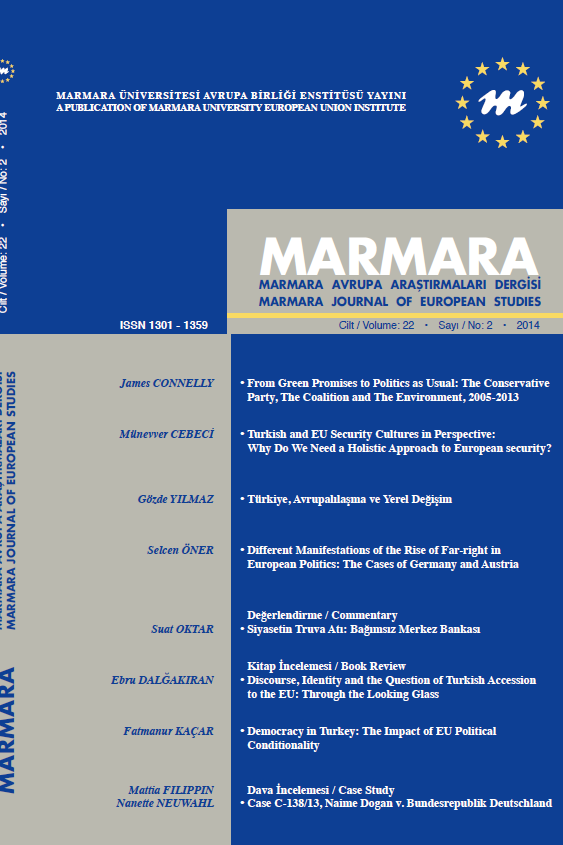THE DUAL CHALLENGE OF DEMOCRATISATION AND EUROPEAN INTEGRATION IN POST -COMMUNIST POLAND
Polonya, komiinizm sonrasznda onemli siyasi ve ekonomik reformlar ya~amaya ba~lamz~tzr. Bu szrada Avrupa Biriligi'nde de yerini almz~tzr. Bunun yam szra Polonya, 1989' den bu yana demokratikle~me hareketleri boyunca sure gelen ciddi parti istikrarszzhklarzna, se~imle ilgili gelgitlere ve ah$zlml$ln olmayan halkp kesim.hareketlerinde ve partilerinde meydana gelen evrimle~meye tamklzk etmi~tir. 2005 yzlmda "siyasi ve ekonomik olarak mal varlzlzgma el konulmu~ ki~ilerin olu~turdugu bir birlik" taraftndan desteklenen gruplar, Katolik muhajazakarlann olu~turdugu toplumsal olarak tutucu sosyal partilerdir. Bu partiler, Avrupa'yz ku~kulu gozlerle takip etmekte, Polonya 'nm siyasi diizeni ve hatta Avrupa 'mn "elit'' olarak bilinen siyasi ser;kin grubunun ihtiraslarma bile giinden giine artan meydan okuma tavnyla yakla~maktadzrlar. Bu makalenin amacz ise 1989'dan beri gerr;ekle~en demokrasi ger;i~inin kilit noktalanm incelemek ve Avrupa Birligi'ne ger;i~ siirecinin Polonya'nm son zamanlardaki siyasi niteligi iizerindeki birikimsel etkisinin haritaszm r;zkarmaktzr. Bu hususta demokratikle~me nin geli~imini engelleyen her iki etkenin de szmrlan r;izilecektir. Polonya siyasi diizeninin r;izecegi miimkiin yollann farkmda olmak ve Polonya-AB'nin gelecek yzllardaki ili~kilerine dair tahminlerde bulunmak ancak boyle bir art alan bilgisi sayesinde miimkiin olacaktzr.
Anahtar Kelimeler:
Polonya, Demokratikleşme, Avrupa Birliği, Populizm, Polonya-AB ilişkileri
THE DUAL CHALLENGE OF DEMOCRATISATION AND EUROPEAN INTEGRATION IN POST -COMMUNIST POLAND
Post-communist Poland has simultaneously undertaken major political and economic reforms and entered the European Union. At the same time, Poland has witnessed significant party instability, electoral volatility and the evolution of unorthodox populist movements and parties in the course of democratisation transition since 1989. Indeed, the electoral successes of a variety of Eurosceptic, socially conservative and devoutly Catholic political parties supported by a 'coalition of the politically and economically dispossessed' in 2005 poses a far reaching challenge to the Polish political order itself and even to the ambitions of European political elites. The aim of this article is to analyse the key aspects of democratic transformation since 1989 and to locate therein both the factors that have impeded the development of democratic consolidation as well as to map the cumulative effect of the European Union accession process on the character of recent Polish politics. Only against such a background will it be possible to discern the possible trajectory of the Polish political order and speculate on the shape of Polish-EU relations in the years ahead.
Keywords:
Poland, Democratisation, European Union, Populism, PolishEU relations,
___
- Trzaskowski, R. (2002). From Candidate to Member State: Poland and the future of the EU. Paris: Institute for Strategic Studies, Occasional Papers No37.
- Zalega, D. (2006) Poland's rightwards shift. Le Monde Diplomatique (English Edition). Retrieved September 13, 2006, from http://mondediplo.com/2006/09/15poland.
- ISSN: 1301-1359
- Başlangıç: 1991
- Yayıncı: Marmara Üniversitesi
Sayıdaki Diğer Makaleler
AVRUPA BİRLİĞİ VE DEMOKRASİ: HALK GÖRÜŞLERİ ANALİZLERİ
THE DUAL CHALLENGE OF DEMOCRATISATION AND EUROPEAN INTEGRATION IN POST -COMMUNIST POLAND
Sustainability of Enlarging EMU: Towards Endogeneity of OCA Criteria or Asymmetry of Shocks?
Bülent ORAL, Nazif SOHTAOĞLU, İrfan GÜNEY
THE EMPIRICAL ANALYSIS OF ECONOMIC INTEGRATION: A LITERATURE SURVEY
ELEKTRONİK İMZADA HUKUKSAL ALT YAPI - TÜRK, ALMAN VE AVRUPA BİRLİĞİ KANUNLARININ GENEL İNCELEMESİ
TURKEY'S FOREIGN POLICY WITHIN THE CONTEXT OF CONFLICTS BETWEEN EUROPEAN AND AMERICAN SECURITY
HELSİNKİ SON SENEDİ, PARİS ŞARTI VE AGİT
KÜRESELLEŞMENİN KAMU YÖNETİMİ ÜZERİNE ETKİSİ: TÜRKİYE ÖRNEĞİ
